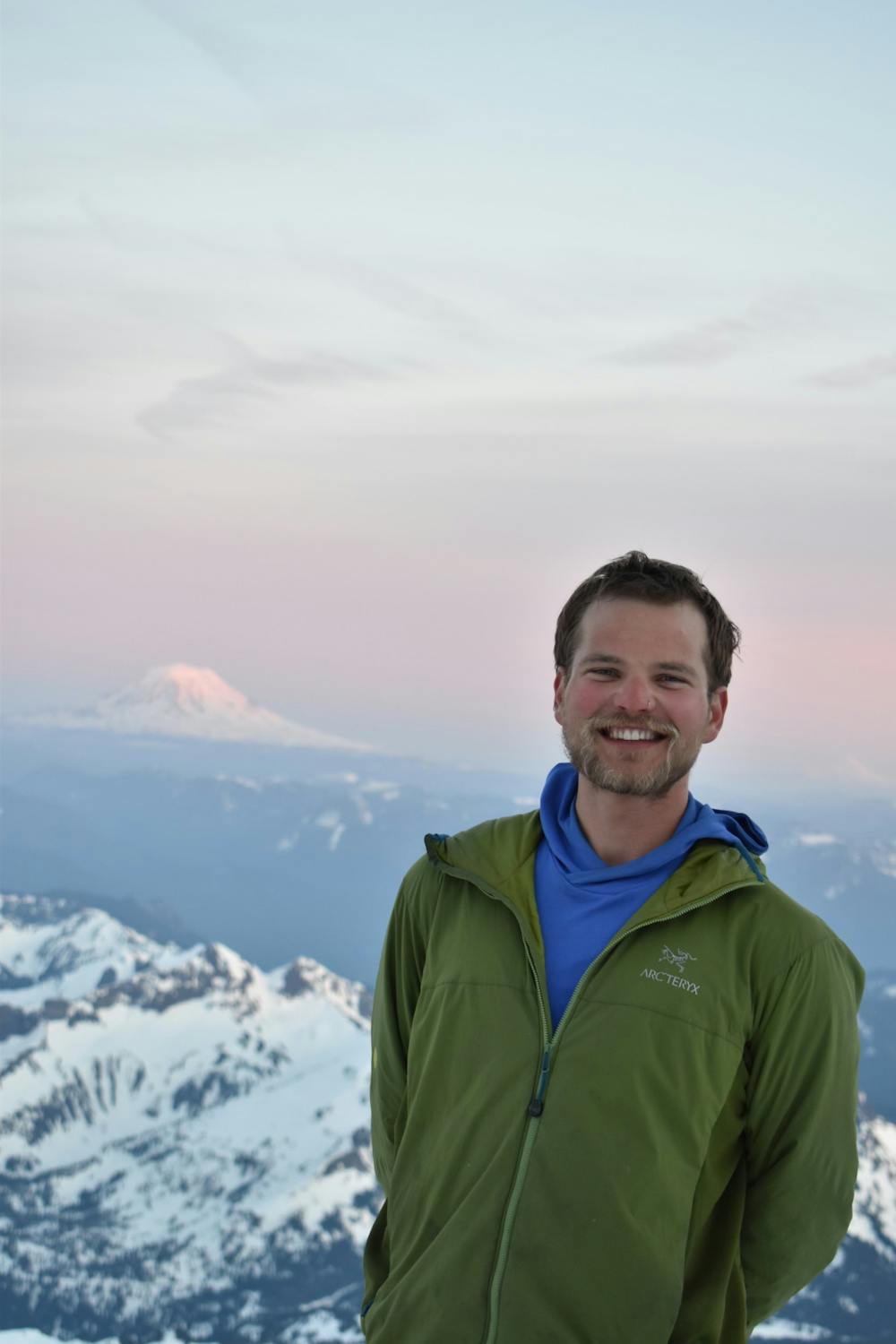Stu Johnson, a 25-year-old Western Washington University student and professional mountain guide, has a deep love for the outdoors, and he wants to share his passion with the Western community.
Johnson started backpacking and hiking in the Seattle area at a young age. When he was 15, a friend’s dad took him up Mount Baker. “That got me hooked on the glaciers,” he said.
He’s now been a mountain guide for almost five years and currently works for International Mountain Guides, a company that guides from the North Cascades to Antarctica.
In Washington, Johnson has climbed Mount Saint Helens, Mount Adams, Mount Baker, Mount Rainier, Mount Olympus and Glacier Peak. He's climbed Mount Denali in Alaska, Aconcagua in Argentina and Ama Dablam and Mera peaks in Nepal.
“I didn't want to have a typical 9-5 job, so guiding is what I figured would open that door,” Johnson said.
Majoring in small-scale agricultural development at Fairhaven College, Johnson has to weigh his love for the mountains with his education.
“I've been balancing taking time off for school and taking time off for guiding,” he said. “I’m trying to eventually graduate but also progress as a guide. It's a tough balance, but I'm following my gut.”

Stu Johnson stands triumphantly in all of his backpacking gear. He and his crew were at the base of Forbidden Peak in Washington on July 18, 2021. // Photo by Max Bond
Johnson’s passion for mountaineering is vast. “You're connected to the natural world and the power of these places makes you feel so insignificant,” he said. “Being out in a huge storm and you're just like, ‘I could get blown off this mountain and the mountain doesn't even care, it doesn't even know I'm there.’ It's really awe-inspiring and refreshing.”
In January, Johnson guided clients up Aconcagua in Argentina. It’s the highest mountain outside the Himalayas and is famous for its strong, cold winds.
“Stu is a very good guide because he's a guide by design. What I mean by that is he rises or lowers what he needs to do based on who he's with and how much support they need and what their experience is," Krys Benyamein, one of the clients on Johnson’s expedition, said.
Benyamein also underscored Johnson’s technical ability to track the weather. Johnson would check multiple weather forecasts and models, compare them with the weather on the mountain and factor them into his decision making.
Due to the weather, many of the groups on the mountain didn't make it to the summit. Johnson’s team did.
“I think without Stu we wouldn't have summited. It was Stu who was really fighting for us, saying it's just wind,” Benyamein said. “ I would go up every mountain in the world with Stu.”
Being a mountain guide comes with physical and mental challenges. Johnson has had to pull people out of crevasses. Regardless of the danger, his passion for the sport remains unwavering.

Sonam, a Sherpa colleague of Stu Johnson hikes solo in Northeast Nepal near Kanchenjunga on Oct. 8, 2023. Kanchenjunga is one of the highest mountains in the world. // Photo by Stu Johnson
“I spend a lot of my time thinking about why I go up to these places and suffer; it's a lot of discomfort. I’ve noticed that having extended periods of discomfort teaches you so much about yourself,” Johnson said. “In Bellingham, I have everything I need, and right now, I’m on the side of a glacier with 80 mph winds and it's 3 a.m., and I’ve been eating dehydrated food for three days. It puts into perspective how fortunate we are in our daily lives.”
Conrad Wharton, a high school English teacher and former guide, confirmed that the job can be brutal. “I don't miss waking up at 10:30 p.m. to summit Mount Rainier on hot summer days. I don't miss climbing Mount Baker in the rain,” he said. “So there's a lot of weird suffering that I don't miss. But, as Mark Twight says, ‘It doesn't have to be fun to be fun.’”
For those who are looking to start their mountaineering journeys there are a wide range of scholarships available. Some of these include the American Mountain Guides Association’s Women's Day scholarship and Alpine Ascent’s BIPOC Guide development program.
“There's a ton of amazing opportunities for women and POC climbers. Washington is the place to learn it. Don't hold back, the opportunities are out there,” Johnson said. “It seems very exclusive, and in many ways it has been historically. Like most niche sports it's been a white male club, but in this part of the world that's changing drastically. For folks who don't see themselves represented in the outdoors, I guarantee someone who is climbing is just like you.”
Liam Walsh (He/Him) is a city news reporter this quarter for the Front. He is a sophomore majoring in journalism with a news/editorial concentration. In his free time he plays for the Western rugby team. Reach him at liamwalsh.thefront@gmail.com






